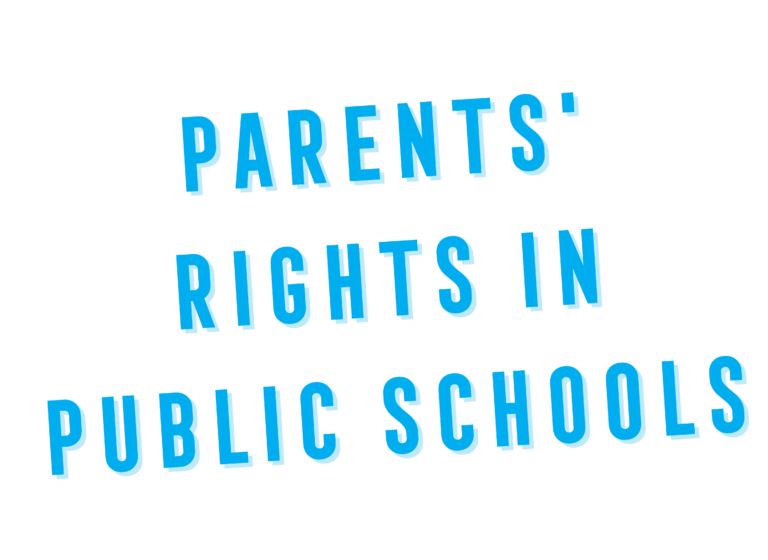District Schools
In a district school, parents have the right to:
- Participate in their child’s school, cooperate with their child’s teacher, and complete a parent-teacher satisfaction survey. (ARS 15-102)
- Learn about the course of study for their children and review learning materials, including the source of any supplemental educational materials. (ARS 15-102)
- Review learning materials and activities in advance. A parent who objects to any learning material or activity on the basis that the material or activity is harmful (because of sexual content, violent content, or profane or vulgar language) may request to withdraw that student from the activity or from the class or program in which the material is used and request an alternative assignment. (ARS 15-113)
- Upon written request, parent may access instructional materials currently used by or being considered for use by the school district. The district must make available at least one copy of the instructional material to be reviewed. Parents may take printed textbooks, printed supplemented books and printed subject matter materials from the district premises for no more than 48 hours. All other materials, including films, may only be reviewed on district premises. (ARS 15-730)
- Opt out of any learning material or activity that the parent finds harmful to the student. This includes material that questions beliefs or practices related to sex, morality, or religion. (ARS 15-102)
- Opt in to sex education curriculum if one is provided by the school district. Without written parental permission, children cannot participate in sex education. (ARS 15-102)
- Be notified in advance if content discussing sexuality is taught in other classes, such as history or literature, and the right to opt a child out of that instruction. (ARS 15-102)
- Be informed about the nature and purpose of extracurricular student clubs and activities. (ARS 15-102)
- Opt in to any video, audio, or electronic materials that are inappropriate for the age of the student. This means the school cannot show a rated-R movie to students under 18 years old without signed, written permission from the child’s parent. (ARS 15-113(D))
- Refuse to provide information for the Student Accountability Information System that does not relate to the provision of educational services to the student. (ARS 15-1042(D)).
- Be informed about parental rights and responsibilities under Arizona law, including: (ARS 15-102)
-
- The right to opt in to a sex education curriculum if one is provided by the school district.
- Open enrollment rights pursuant to section ARS 15-816.01.
- The right to opt out of assignments pursuant to ARS 15-102.
- The right to opt out of immunizations pursuant to ARS 15-873.
- The promotion requirements prescribed in ARS 15-701.
- The minimum course of study and competency requirements for graduation from high school prescribed in ARS 15-701.01.
- The right to opt out of instruction on the acquired immune deficiency syndrome (AIDS) pursuant to ARS 15-716.
- The right to review test results pursuant to ARS 15-743.
- The right to participate in gifted programs pursuant to ARS 15-779.01.
- The right to access instructional materials pursuant to ARS 15-730.
- The right to receive a school report card pursuant to ARS 15-746.
- The attendance requirements prescribed in ARS 15-802, 15-803 and 15-821.
- The right to public review of courses of study and textbooks pursuant to ARS 15-721 and 15-722.
- The right to be excused from school attendance for religious purposes pursuant to ARS 15-806.
- Policies related to parental involvement pursuant to ARS 15-102.
- The right to seek membership on school councils pursuant to ARS 15-351.
- Information about the student accountability information system as prescribed in ARS 15-1041.
- The right to access the failing schools tutoring fund pursuant to ARS 15-241.
- Written Request for Information: Parents may submit a written request for information related to the rights outlined in ARS 15-102 to the school principal or the superintendent. The principal or superintendent shall respond within ten days. If the request for information is denied or the parent does not receive a response within 15 days, the parent may submit a written request to the school district governing board. The board shall formally consider the request at the board’s next public meeting. (ARS 15-102(D))
Charter Schools
In charter schools, parents have the right to:
- Review learning materials and activities in advance. A parent who objects to any learning material or activity on the basis that the material or activity is harmful (because of sexual content, violent content, or profane or vulgar language) may request to withdraw that student from the activity or from the class or program in which the material is used and request an alternative assignment. However, a charter school may require parents to waive the right to object as a condition for enrollment if the school provides a complete list of books and materials to be used each year before the student enrolls. (ARS 15-113).
- Opt in to any video, audio, or electronic materials that are inappropriate for the age of the student. This means the school cannot show a rated-R movie to students under 18 years old without signed, written permission from the child’s parent. (ARS 15-113)
- Refuse to provide information for the Student Accountability Information System that does not relate to the provision of educational services to the student. (ARS 15-1042(D)).
This is a brief summary of a complex area of law and is not meant as specific legal advice. Consult an attorney if you have questions about your specific situation.***






